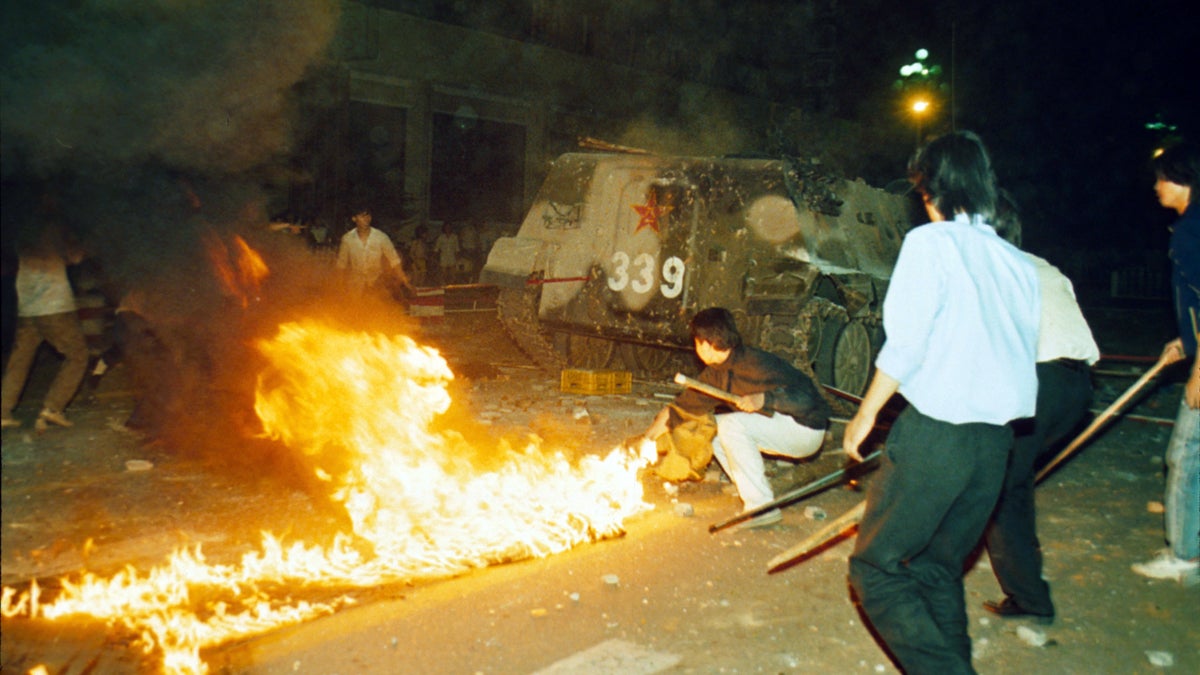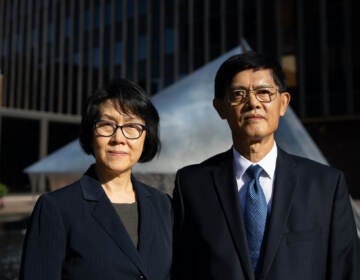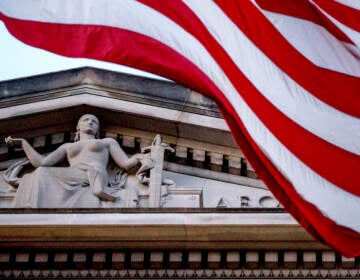Tiananmen and the erasure of history

Student protesters are shown putting a barricade in front of a burning armored personnel carrier that rammed through student lines, June 4, 1989. Many were injured and killed during an army attack on pro-democracy demonstrators in Beijing's Tienanmen Square. (AP Photo, file)
The Chinese government employs falsehood and terror to blot out the memory of the murders in Tiananmen Square 25 years ago. And the economic success and consumer culture fed to young Chinese dissuades them from even wanting to know the truth.
I owe my job — and much else — to Neil Postman, the pioneering communications scholar who hired me nearly two decades ago. And I’ve been thinking a lot about Neil over the past few weeks, as we near the 25th anniversary of the murders in Tiananmen Square.
On June 4, 1989, Chinese soldiers gunned down at least 241 protesters in the square. We don’t know if the death toll was more than that, as many witnesses insist, because the government has never allowed a full investigation of the incident. But we do know that China has enjoyed one of the most remarkable economic booms in world history since that time, lifting hundreds of millions of people out of poverty.
So the Chinese have much more access to consumer goods and especially to entertainment, which Postman feared would dull people into political passivity. In Neil’s most famous book, “Amusing Ourselves to Death,” he contrasted George Orwell — the gloomy prophet of state violence and propaganda — with Aldous Huxley, who worried that rulers would control citizens via pleasure rather than pain. Neil thought Huxley was right: We had more to fear from the velvet glove of consumerism than from the hard fist of totalitarianism.
In contemporary China, though, they go hand in hand. Young people in China’s growing middle class have become accustomed to a level of affluence unimaginable in 1989. They love their iPods and smartphones, and they generally avoid discussing anything controversial — like the Tiananmen episode — that might jeopardize their chances to earn, spend and acquire.
But the government also employs falsehood and terror to blot out memory of the massacre, which is simply omitted from most high school history textbooks. College texts denounce the protests as a foreign-controlled plot to crush Chinese socialism. They also praise the patience and heroism of the attacking soldiers, who allegedly opened fire in self-defense.
All lies. The Tiananmen protesters were demanding the freedoms that are enshrined in their own national constitution. And soldiers fired indiscriminately into the crowds on June 4, killing bystanders who had come to watch the demonstration instead of the students who led the protests.
But if you say any such thing in China, you’re risking your life and livelihood. Over the past few weeks, more than a dozen people have been arrested as part of a “stability maintenance” campaign to block discussion of Tiananmen. Five activists who held a private meeting about the forthcoming anniversary were charged with “creating a public disturbance”; another was detained for posting online a selfie of himself in the square.
Meanwhile, as during previous anniversaries of Tiananmen, the government has been scrubbing the Internet of any references to the massacre. If you search for “1989” on Baidu Baike, China’s version of Wikipedia, you find only two facts: 1989 is the name of a computer virus, and — surprise! — it’s the number between 1988 and 1990. Likewise, all references to the numbers 6 and 4 are blocked; ditto for “May 35,” which computer scribes have used in an unsuccessful attempt to evade the censors.
The first thing you notice about this campaign is its noxious combination of pettiness and paranoia. The so-called “sensitive words” that authorities have banned from weibo — the Chinese equivalent of Facebook — include “today,” “tomorrow,” and, yes, “sensitive word.” Censors have also tried to cleanse the Net of any image resembling a tank, lest it conjure memories of the solitary figure who famously blocked tanks at Tiananmen.
The second thing you notice is that propaganda works. When journalist Louisa Lim recently showed the famous photo of “Tank Man” to 100 students at elite Chinese universities, only 15 could identify it. And within that smaller group, most of the students toed the party line; one said the Tiananmen protest was stirred up by “foreign reactionaries,” while another insisted that the Tank Man picture was a hoax.
Other students simply refused to discuss it, sensing that it could harm their prospects for career advancement and prosperity. As George Orwell foresaw, China’s dictators have enforced their will with brutality and subterfuge. But they have also purchased loyalty with consumer goods and comforts, just as Aldous Huxley predicted.
And that echoes my friend Neil Postman, who died of lung cancer in 2003. “Jon, politics is hard.” Neil once told me. “Buying stuff is a lot more fun.” China’s rulers are banking on the same thing. But if fun doesn’t work, there’s always a gun behind it. That’s the real lesson of Tiananmen, from 1989 to today.
WHYY is your source for fact-based, in-depth journalism and information. As a nonprofit organization, we rely on financial support from readers like you. Please give today.




